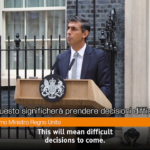With alert arising across Europe, the United Kingdom is getting back to the debate about the European Union membership. The country seems to be perfectly divided. Recent polls show that more than half of voting people are supporting “Brexit” –UK exit from the EU-, while only 47% support the membership. Similarly, the political class is sharply divided: on one hand, the UK Independent Party (UKIP) is against the Union, while the Prime Minister is trying to negotiating better conditions for the country. Moreover, a referendum has been scheduled at the end of 2017, giving Brits the chance to express their position.
The UK has always had a particular position in Europe, close to the events ongoing in the mainland but far enough to be protected from them. From a political perspective, the UK belongs to the EU, though she doesn’t embrace all the aspects. Pound beat euro, while Schengen didn’t manage to cross the Channel. More than this. Despite the strong economic posture, London has failed in playing a leading role in the continent, as Germany or France have already tried (and managed) to do. However, the National Security Strategy highlights UK willing to play a distinctive role in the region and globally.
So, here is the question: what does Brits really want? 4 requests from Cameron. First, a multi-currency Union, in order to better protect the interests of those countries who are not in the Eurozone. Secondly, removing useless rules and limits that curb growth and competitiveness of the European market. Thirdly, strengthening sovereignty (for all national parliaments), allowing countries the right not to accept some reforms or policies (opt-out option). Finally, more control on immigration and benefits to foreigners only after 4 years in the country.
Understandable requests? We should analyse three core aspects that summarise what Europe represents for the UK.
- The UK enjoys the benefits of a single market, based on free movement of goods, services and capital. This facilitates the export of British products at competitive prices, something that would be compromised, should the UK decide to exit the Union. In this fashion, the country would no longer be bounded by European legislation; however, some countries might find more convenient to do business with the “EU brothers”.
- Despite defects and internal weaknesses, the EU represents-or at least should- “Europe’s voice”. Belonging to the EU ensures its members a platform where each country can express its point of view and protect national interests, while giving a voice to those in common. Leaving the EU could turn Great Britain in an outsider, thus losing contact with European reality but also the opportunity to take the leadership in the continent.
- On one hand, a common defence policy that should guarantee more efficacy compared to members’ single actions. But there’s another side of the coin: though she didn’t agree to Schengen agreements, freedom of movement forces the UK to apply easier control mechanism for people travelling from EU countries (e.g. no visa needed). Since the end of the Balkan Wars, the abolition of internal borders has facilitated arms transport. Today, history repeats itself, but this time with free movement of terrorist cells, holding European passports and free to travel across countries bypassing any kind of controls. After Paris attacks, several EU members have been doubting this system.
So, what will the UK choose? There might be a shift towards isolationism, to find safety and economic stability outside the European bloc. Would it be enough to ensure the British Islands a safer future? Some doubts about it. Tensions and perils are already grounded in British society, EU or not. And undertaking a political, economic and social battle alone might be less simple than it sounds. On the other hand, we might see a different UK, which, stronger from the privileges obtained, will support a more strengthened Union and take the lead of a continent that seems to have lost orientation and compactness. Again, doubts. It looks more like Cameron is trying to stay with one foot in and one outside. “Yes, but…”, nothing new at Downing Street.
However, is it fair in an institution of 28 members to satisfy the interests of a single one as a key condition to remain in the Union? If London can benefits particular conditions, then Budapest, Madrid of Prague should have the same right. And where is the logic of a Union if each member participates only to the extent to which it most benefits?
Paola Fratantoni







